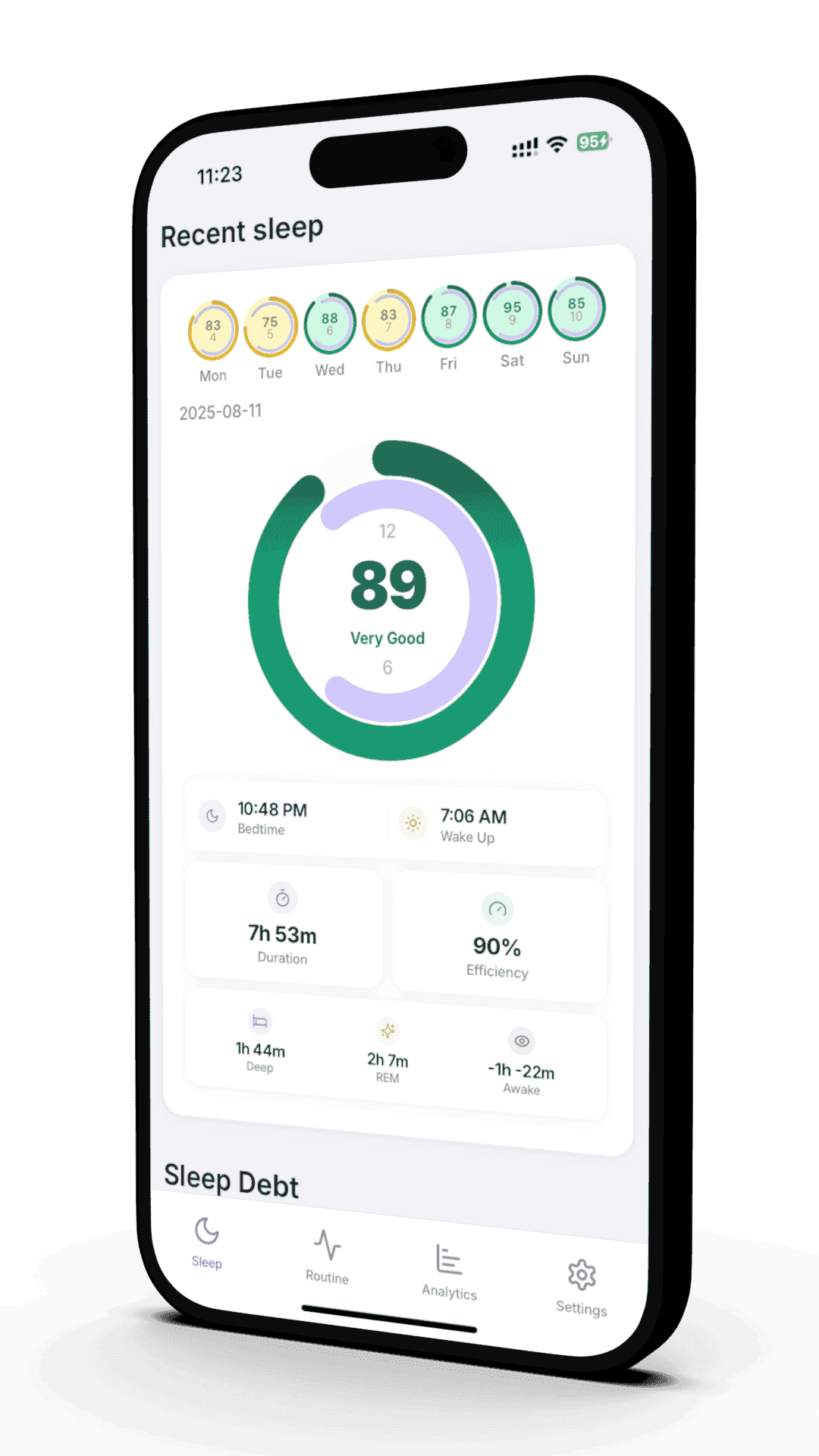The Hidden Cost of Sleep Debt: How Poor Sleep Impacts Your Brain and Body
Sleep debt isn't just about feeling tired. It's actually a serious health condition that affects your cognitive performance, emotional well-being, and physical health in ways you might not expect.
Key Insight: Even one night of poor sleep can impair your cognitive function equivalent to being legally intoxicated.
In our fast-paced world, sleep often becomes the first sacrifice we make for productivity, social commitments, or entertainment. But what many people don't realize is that skipping sleep isn't just borrowing time. You're actually accumulating a debt that compounds with serious interest.
Sleep debt, the cumulative effect of not getting enough sleep, doesn't just make you feel groggy. It fundamentally alters how your brain processes information, how your body repairs itself, and how you navigate the world around you.
What is Sleep Debt?
Sleep debt is the difference between the amount of sleep you need and the amount you actually get. If you need 8 hours of sleep but only get 6, you've accumulated 2 hours of sleep debt. Unlike financial debt, you can't simply "pay it back" with one good night's sleep.
Sleep Debt Accumulation Example:
The Cognitive Toll of Sleep Debt
Your brain treats sleep debt like a medical emergency. When you're sleep-deprived, your prefrontal cortex (the part responsible for decision-making, attention, and emotional regulation) essentially goes offline.
Memory Formation
Sleep debt impairs your ability to form new memories by up to 40%. Your brain literally can't consolidate the day's learning without adequate sleep.
Attention & Focus
Even mild sleep debt causes attention lapses every 3-5 minutes, dramatically reducing productivity and increasing error rates.
Decision Making
Sleep-deprived individuals make increasingly risky decisions and struggle to evaluate consequences effectively.
Emotional Regulation
Sleep debt amplifies negative emotions by 60% while reducing your ability to process positive experiences.
Research Spotlight: The Intoxication Equivalent
A study by the University of Pennsylvania found that sleeping 6 hours per night for two weeks impaired cognitive performance equivalent to being awake for 48 hours straight. That's legally drunk levels of impairment.
Physical Health Consequences
Sleep debt doesn't just affect your mind. It wreaks havoc on virtually every system in your body. The physical toll accumulates silently but persistently.
Immune System Suppression
Just one night of sleep debt reduces immune function by 30%. People with chronic sleep debt are 3x more likely to catch a cold and recover 50% slower from illness.
Metabolic Disruption
Sleep debt disrupts hormones that control hunger (ghrelin) and satiety (leptin), leading to increased appetite and weight gain. It also impairs insulin sensitivity, increasing diabetes risk.
Cardiovascular Stress
Chronic sleep debt increases blood pressure, inflammation, and stress hormones. People sleeping less than 6 hours nightly have a 48% higher risk of heart disease.
Cellular Repair Disruption
During deep sleep, your body repairs DNA damage and clears metabolic waste from the brain. Sleep debt prevents this crucial maintenance, accelerating aging.
Recovering from Sleep Debt
The good news? Sleep debt is recoverable, though it takes time and consistency. You can't "catch up" with one marathon sleep session, but strategic recovery can restore your cognitive and physical health.
The 3-2-1 Recovery Method:
- 3 weeks:To recover from acute sleep debt (1-2 weeks of poor sleep)
- 2 months:To recover from chronic sleep debt (months of poor sleep)
- 1 extra hour:Add 1 hour to your normal sleep need during recovery
Strategic Recovery Tips:
Prioritize Sleep Consistency
Go to bed and wake up at the same time every day, even on weekends.
Gradual Extension
Add 15-30 minutes to your sleep time weekly until reaching your target.
Prevention is Key
The best approach to sleep debt is prevention. Small, consistent changes to your sleep habits can prevent the accumulation of sleep debt and its devastating effects.
How Reverie Helps Prevent Sleep Debt
Reverie tracks your daily routines and sleep patterns to identify factors that contribute to sleep debt before it accumulates. By understanding what affects your sleep quality, you can make informed decisions about your habits.
- • Real-time sleep debt tracking and alerts
- • Personalized recommendations to optimize sleep timing
- • Habit correlation analysis to identify sleep disruptors
- • Recovery planning when sleep debt occurs
The Bottom Line
Sleep debt isn't a badge of honor. It's a serious health condition that impairs every aspect of your life. From reduced cognitive function to increased disease risk, the costs of sleep debt compound over time.
The good news is that sleep debt is both preventable and recoverable. By prioritizing consistent, quality sleep and using tools to track your sleep patterns, you can avoid the hidden costs of sleep debt and unlock your full potential.
Remember: Every night of good sleep is an investment in your cognitive performance, physical health, and overall well-being.
Related Articles

Complete Guide to Apple Watch Sleep Tracking: Setup, Accuracy, and Tips for 2025
Learn everything about Apple Watch sleep tracking - from setup and accuracy to advanced tips for better sleep monitoring.
Ready to Optimize Your Sleep?
Join our beta program and discover what's affecting your sleep quality. Get personalized insights and build better sleep habits with Reverie.
✓ Free beta access ✓ Shape the product ✓ First to get updates ✓ Requires Apple Watch
Join 50 beta testers already improving their sleep
Written by the Reverie Team
Based on sleep research and scientific studies